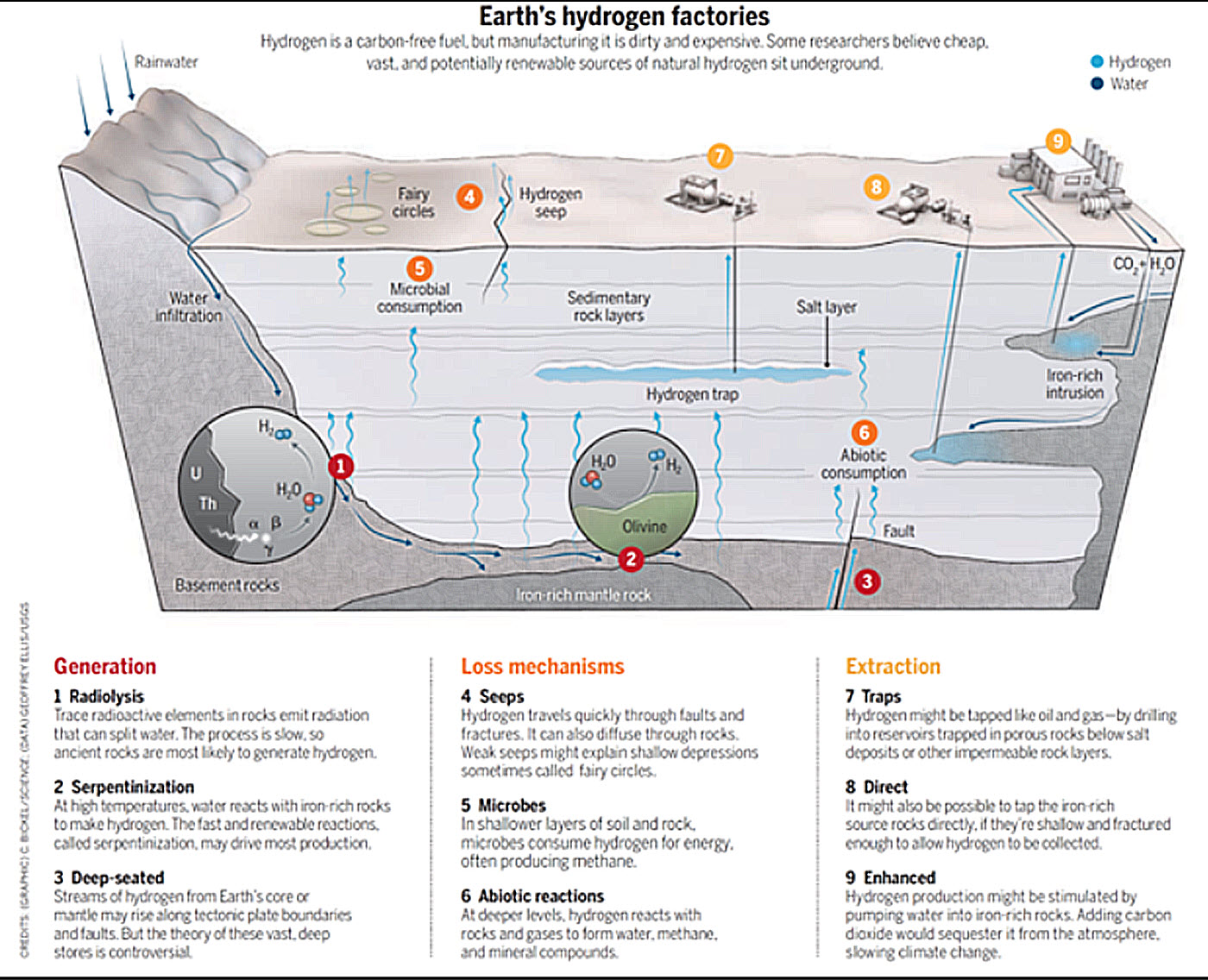
Gold Hydrogen – Set to Satisfy Global Energy Thirst for Centuries
February 20, 2024The energy landscape is buzzing with anticipation as geologists across the globe are laying the groundwork for what could become the next big energy boom. Touted as a cleaner and more abundant alternative to traditional energy sources, hydrogen—with its immense innate potential—is poised to spark a revolution akin to the historical gold rushes that drastically transformed societies.
An Untapped Treasure Beneath Our Feet
The Vast Waterless Seas of Energy
Scientists have uncovered that our planet harbors an astonishing reservoir of hydrogen gas, a fuel source long overlooked due to its elusive nature. An unpublished study by the US Geological Survey surfaces claims that as much as 5 trillion tonnes of hydrogen could be stashed in these subterranean reserves internationally.
Hydrogen’s Moment in Earth’s Sunlight
At the recent American Association for the Advancement of Science annual meeting in Denver, Geoffrey Ellis, spearheading this project, made the striking revelation: “While the majority of this hydrogen is likely beyond our reach, the mere extraction of a small fraction could satisfy the global demand—projected at 500 million tonnes per year—for hundreds, if not thousands, of years.”
The surging interest in hydrogen as both a fuel and an industrial cornerstone, especially for vital processes like ammonia fabrication for fertilizers, has so far gravitated towards types dubbed ‘blue’ and ‘grey hydrogen.’ The latter are produced through chemical restructuring of methane-based gas and become ‘blue’ when emissions are under control.
Conversely, ‘green hydrogen’ stems from water electrolysis motivated by renewable power sources. However, despite their environmental accolades, green and blue hydrogen can’t quite match the purity and cost-effectiveness of the naturally occurring variety.
The Coming Boom in Gold Hydrogen
Mengli Zhang from the Colorado School of Mines heralded at the conference: “A gold rush for ‘gold’ hydrogen is on the horizon,” alluding to natural or geologic hydrogen as a cheaper and cleaner alternative. Start-ups like Koloma, infused with a $91 million investment from entities like Bill Gates’s Breakthrough Energy Ventures, are betting big on this nascent energy promise.
“Geologic hydrogen represents an exceptional chance to harvest clean hydrogen in a way that significantly scales back not just carbon footprints but also land and water usage, along with energy consumption,” Paul Harraka, Koloma’s chief business officer, highlighted.
The Path to Pioneering Production
Natural Hydrogen Energy, another frontier US company, has broken ground with an exploratory well in Nebraska. “Transitioning to commercial production is around the corner, expected within a couple of years,” affirmed Viacheslav Zgonnik, CEO, signaling an imminent industry shift.
For long, the scientific consensus held that hydrogen gas wouldn’t survive near Earth’s surface. Microorganisms underground would consume it, or it would vanish in geochemical reactions. Yet, Alexis Templeton of the University of Colorado, Boulder, revealed at the AAAS meeting that significant hydrogen creation occurs when specific minerals react with water.
Seeking Hydrogen, Striking New Energy
The geological gold rush necessitates new territories, devoid of conventional oil and gas indicators. “Our search has been misdirected; we haven’t employed the suitable tools nor targeted the right areas,” affirmed Ellis. Yet, discoveries are cropping up globally, such as from Albania’s Bulqizë chromite mine, releasing over 200 tonnes of hydrogen annually.
Bourakébougou in Mali represents a pioneering chapter in natural hydrogen extraction, delivering electricity to villagers from a steady flow of nearly pure hydrogen since 2012. This discovery could well herald a shift similar to that of 1859 when Edwin Drake struck oil in Pennsylvania, birthing the petroleum era.
FAQs About Gold Hydrogen
What is gold hydrogen?
‘Gold’ hydrogen refers to hydrogen extracted from natural geological processes where the element is produced by the interaction between water and certain minerals in the Earth’s crust.
Where has gold hydrogen been found?
Significant deposits of gold hydrogen have been found in diverse locations such as the Bulqizë chromite mine in Albania and the village of Bourakébougou in Mali.
How can gold hydrogen be used?
Gold hydrogen can be used similarly to other forms of hydrogen, serving as a clean fuel source for energy generation, and as a raw material in industrial processes like fertilization production.
What are the different names for naturally occurring hydrogen?
Answer: Naturally occurring hydrogen is known by several names including white hydrogen, geologic hydrogen, or gold hydrogen. This type of hydrogen is formed through natural processes, as opposed to laboratory or industrially produced hydrogen. Other types of hydrogen include green hydrogen, produced from renewable energy sources, and grey, brown, blue or black hydrogen, derived from fossil fuels. Natural hydrogen or gold hydrogen, can be renewable, non-polluting and often offers lower costs than its industrial counterpart. It has been found in various source rocks beyond the typical sedimentary basins where oil companies operate.
Why is the energy sector excited about gold hydrogen?
Gold hydrogen presents a sustainable, cost-effective, and environmentally friendly alternative to blue and grey hydrogen. It promises a substantially lower carbon, land and water footprint and could meet global energy demands for centuries, provided its extraction is viable.
In this emerging narrative, a harmonious juncture between old-world desires for discovery and the modern mandate for sustainability is drawn. As we stand on the precipice of this ‘gold rush,’ the collective gaze is affixed to the horizon where the energy sector awaits its next great epoch.



 With over 15 years of reporting hydrogen news, we are your premier source for the latest updates and insights in hydrogen and renewable energy.
With over 15 years of reporting hydrogen news, we are your premier source for the latest updates and insights in hydrogen and renewable energy.